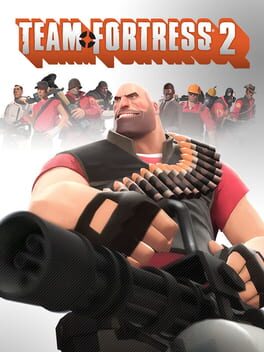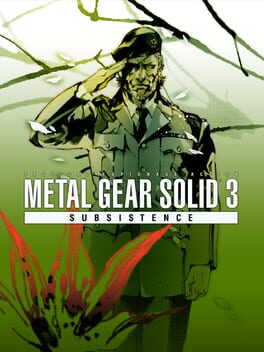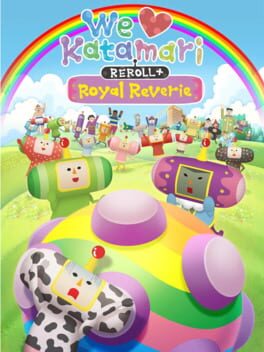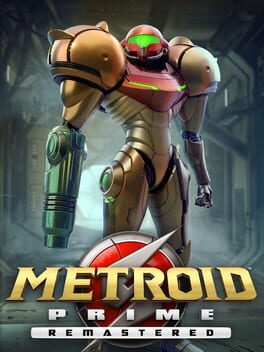KanbaruLover
Bio
I don't write very long reviews and I try not to be too harsh.
I also try to only play video games I have a hunch that I will, at worst, like.
I've bought far too many video games to ever truly finish my library, but at least we can all sit down with a nice cup of our favorite beverage and agree that this is a much better hobby than fantasy football.
I don't write very long reviews and I try not to be too harsh.
I also try to only play video games I have a hunch that I will, at worst, like.
I've bought far too many video games to ever truly finish my library, but at least we can all sit down with a nice cup of our favorite beverage and agree that this is a much better hobby than fantasy football.
Badges

GOTY '23
Participated in the 2023 Game of the Year Event

Loved
Gained 100+ total review likes

Well Written
Gained 10+ likes on a single review

Popular
Gained 15+ followers

Shreked
Found the secret ogre page

2 Years of Service
Being part of the Backloggd community for 2 years

GOTY '22
Participated in the 2022 Game of the Year Event

Gone Gold
Received 5+ likes on a review while featured on the front page

Best Friends
Become mutual friends with at least 3 others

Liked
Gained 10+ total review likes

N00b
Played 100+ games

GOTY '21
Participated in the 2021 Game of the Year Event

Noticed
Gained 3+ followers
Favorite Games
181
Total Games Played
000
Played in 2024
017
Games Backloggd
Recently Reviewed See More
Imagine everything that on the surface makes you think of Darkest Dungeon but none of the fun you'd get from actually playing it.
The combat is worse, the slow roguelite progression over every failed run feels bad, and the driving is actually terrible.
I'd rather not keep forcing myself to keep playing or hold out for when I finally have enough stuff to make the game fun.
Please stop making games like this that are only fun after you've sunk cost fallacy'd yourself into not being able to remember how much you had to grind to get there.
Darkest Dungeon 1 is a genuinely good and fun party/town management game with a great aesthetic. Darkest Dungeon 2 just feels like it's chasing the roguelite trend with systems that work against wanting to play multiple runs again and again.
Please just go play Darkest Dungeon, this ain't it chief.
The combat is worse, the slow roguelite progression over every failed run feels bad, and the driving is actually terrible.
I'd rather not keep forcing myself to keep playing or hold out for when I finally have enough stuff to make the game fun.
Please stop making games like this that are only fun after you've sunk cost fallacy'd yourself into not being able to remember how much you had to grind to get there.
Darkest Dungeon 1 is a genuinely good and fun party/town management game with a great aesthetic. Darkest Dungeon 2 just feels like it's chasing the roguelite trend with systems that work against wanting to play multiple runs again and again.
Please just go play Darkest Dungeon, this ain't it chief.
Katamari Damacy in recent years has become one of my favorite video games of all time. It's hard to find a game like it that lets you just have such a wonderful time just rolling everything up into a giant ball while listening to an incredible soundtrack. We Love Katamari is fascinating in that it's one of those meta sequels where I don't think anyone ever expected Damacy to take off quite like it did. In a sense, We Love Katamari is a sequel that was made for everyone that is literally saying "we love Katamari". That love is then expressed throughout the games narrative of fulfilling requests of fans that just think the Prince and the King of All Cosmos are just the coolest guys in the world.
That being said, I'm not sure I can rate We Love Katamari as high as Katamari Damacy just because it doesn't feel like it's doing a whole lot more that Damacy had already set the foundation for. It's a short game just like Damacy, and it does have it's very own original soundtrack and new stages, but otherwise it doesn't bring very much to the "rolling up a giant ball full of stuff" category of gameplay. That's not to say the game isn't fun, but the most I felt like it did new was have more gimmick stages where your clear conditions are to have a certain amount or types of items in your katamari.
I did still really enjoy my time with We Love Katamari, and I do think its goal as a sequel wasn't so much to reinvent the wheel, or in this case the katamari. More so I think this was just an excuse to give fans more of Katamari Damacy, as it feels more like an extension of Damacy rather than it's own game. I believe both games these days are probably best enjoyed when played back to back, and I'm very happy to have both of them easily attainable on multiple platforms for people to enjoy. There really aren't any other games like these and I still derive a great amount of joy just rolling up a big ball after a hard day at work. Recommended!
That being said, I'm not sure I can rate We Love Katamari as high as Katamari Damacy just because it doesn't feel like it's doing a whole lot more that Damacy had already set the foundation for. It's a short game just like Damacy, and it does have it's very own original soundtrack and new stages, but otherwise it doesn't bring very much to the "rolling up a giant ball full of stuff" category of gameplay. That's not to say the game isn't fun, but the most I felt like it did new was have more gimmick stages where your clear conditions are to have a certain amount or types of items in your katamari.
I did still really enjoy my time with We Love Katamari, and I do think its goal as a sequel wasn't so much to reinvent the wheel, or in this case the katamari. More so I think this was just an excuse to give fans more of Katamari Damacy, as it feels more like an extension of Damacy rather than it's own game. I believe both games these days are probably best enjoyed when played back to back, and I'm very happy to have both of them easily attainable on multiple platforms for people to enjoy. There really aren't any other games like these and I still derive a great amount of joy just rolling up a big ball after a hard day at work. Recommended!
I originally played Metroid Prime for the GameCube when I was much younger. I never finished it, and remember only making it as far as Phendrana Drifts before I became too frustrated at not knowing where to go, where I then proceeded to put the game down and never pick it back up. Today I have finished Metroid Prime Remastered to make up for my impatience in my youth, and I come away from it thinking, "Yeah, I'd say dropping it over that was pretty justified."
I'd wager most of the appeal for Metroid Prime comes from the feeling you get of being a space adventurer on an unknown planet. After all, Samus Aran is a fantastic character to play as in Metroid and most games don't feel quite as alien in it's aesthetic in quite the same way as Metroid. In Metroid Prime, you're never pointed to go in any direction, only ever trusting your map, data logs, and memory for points of interest along your journey. The game definitely had that affect on me for most of the game, though putting the game down for any long amount of time would result in me needing to spend several minutes going back over the map screen and remembering those points of interests. Like the 2D games, you're given a good amount of freedom to look around an area even with your limited abilities at the beginning of the game, always keeping note to come back through later when you might have a new ability that opens up more of the area.
That's more or less the gameplay loop for Metroid Prime; comb through zones to find new abilities until you finally have all of your arsenal to beat the game (wow it's like a Metroid game or something). The only real issue I take with the gameplay loop in this game is, most of the time, you can never judge if a new location you can access is progress towards a new ability or a dead end. The game has a strange way of giving you an incredibly valuable ability in one room, showing you a door that ability can now open, only for you to hit a dead end immediately upon exploring it. Now is there anything so wrong about finding more rooms that require more abilities to unlock? No, especially in a series that relishes in making the player backtrack as frequently as Metroid does. I guess I just found myself becoming annoyed whenever I found myself creating more mental checkmarks of zones in the future rather than being able to knock out a good chunk of an area when getting a new ability.
Combat is... fine... until it's not. Enemies early on are very simple; you shoot small enemies with your laser beam and big enemies get the missiles. It does the job and can be pretty fun at times, even if most harder enemies before the middle of the game start having weak points only on their back. Later on, you also start to unlock different beam weapons, each one serving a separate use and unique interactions with puzzles and enemies. But where the combat goes from being fine to not fine is once they start introducing enemies that can only be damaged by specific weapon types.
This starts out harmless enough with enemies that are more like stage hazards requiring a specific laser beam weapon to destroy them. But this problem caps once you hit an area where suddenly most enemies in the zone are now color coded, requiring the weapon type that their color matches with to deal any damage. What's worse is these enemies aren't even unique from one another, they all still have the same basic "run around, shoot you at a distance, melee if you get close" move set, no matter which color they are. I can see what they might've been going for, having enemies act as a sort of light puzzle to solve in each room, but this made me end up opting out of combat entirely when needing to backtrack through those rooms later on.
I'll be keeping this review spoiler free as usual (unless revealing gameplay elements like this is a spoiler, in which case, my bad), but just know that I hated this inclusion in the game and it never gets any better from that point onwards; if anything it gets worse.
Overall I'd say that, for most things I enjoyed in this game, it always came with their own frustrations. I love the moment in a Metroid game where you finally have your full arsenal of weapons and moves, but I can't say I enjoyed the frustration of constantly hitting dead ends before getting to that point in this one. Combat in 3D compared to the 2D games still feels like what you'd expect, but falls on it's face later on in a poor attempt at trying to mix things up for the end game. I'd say the positives mostly outweigh the negatives and at least the problem of not knowing where dead ends are is a feeling I wouldn't have again on another replay. I consider myself a fairly big Metroid fan and I'd slept on this game for quite some time, always hearing that it was a beloved classic and a great example of transitioning a style of play from 2D to 3D. I'd say I'd agree with that sentiment, though a part of me does think the game lives in such a positive space because it's well beloved for it's sci-fi aesthetic and impressive graphical fidelity for the time. Everyone likes to remember their favorite childhood game being just as good as they remembered. But Metroid Prime is definitely a game where you have to eventually take off your red rose tinted glasses at times; that enemy you're looking at is purple, after all.
I'd wager most of the appeal for Metroid Prime comes from the feeling you get of being a space adventurer on an unknown planet. After all, Samus Aran is a fantastic character to play as in Metroid and most games don't feel quite as alien in it's aesthetic in quite the same way as Metroid. In Metroid Prime, you're never pointed to go in any direction, only ever trusting your map, data logs, and memory for points of interest along your journey. The game definitely had that affect on me for most of the game, though putting the game down for any long amount of time would result in me needing to spend several minutes going back over the map screen and remembering those points of interests. Like the 2D games, you're given a good amount of freedom to look around an area even with your limited abilities at the beginning of the game, always keeping note to come back through later when you might have a new ability that opens up more of the area.
That's more or less the gameplay loop for Metroid Prime; comb through zones to find new abilities until you finally have all of your arsenal to beat the game (wow it's like a Metroid game or something). The only real issue I take with the gameplay loop in this game is, most of the time, you can never judge if a new location you can access is progress towards a new ability or a dead end. The game has a strange way of giving you an incredibly valuable ability in one room, showing you a door that ability can now open, only for you to hit a dead end immediately upon exploring it. Now is there anything so wrong about finding more rooms that require more abilities to unlock? No, especially in a series that relishes in making the player backtrack as frequently as Metroid does. I guess I just found myself becoming annoyed whenever I found myself creating more mental checkmarks of zones in the future rather than being able to knock out a good chunk of an area when getting a new ability.
Combat is... fine... until it's not. Enemies early on are very simple; you shoot small enemies with your laser beam and big enemies get the missiles. It does the job and can be pretty fun at times, even if most harder enemies before the middle of the game start having weak points only on their back. Later on, you also start to unlock different beam weapons, each one serving a separate use and unique interactions with puzzles and enemies. But where the combat goes from being fine to not fine is once they start introducing enemies that can only be damaged by specific weapon types.
This starts out harmless enough with enemies that are more like stage hazards requiring a specific laser beam weapon to destroy them. But this problem caps once you hit an area where suddenly most enemies in the zone are now color coded, requiring the weapon type that their color matches with to deal any damage. What's worse is these enemies aren't even unique from one another, they all still have the same basic "run around, shoot you at a distance, melee if you get close" move set, no matter which color they are. I can see what they might've been going for, having enemies act as a sort of light puzzle to solve in each room, but this made me end up opting out of combat entirely when needing to backtrack through those rooms later on.
I'll be keeping this review spoiler free as usual (unless revealing gameplay elements like this is a spoiler, in which case, my bad), but just know that I hated this inclusion in the game and it never gets any better from that point onwards; if anything it gets worse.
Overall I'd say that, for most things I enjoyed in this game, it always came with their own frustrations. I love the moment in a Metroid game where you finally have your full arsenal of weapons and moves, but I can't say I enjoyed the frustration of constantly hitting dead ends before getting to that point in this one. Combat in 3D compared to the 2D games still feels like what you'd expect, but falls on it's face later on in a poor attempt at trying to mix things up for the end game. I'd say the positives mostly outweigh the negatives and at least the problem of not knowing where dead ends are is a feeling I wouldn't have again on another replay. I consider myself a fairly big Metroid fan and I'd slept on this game for quite some time, always hearing that it was a beloved classic and a great example of transitioning a style of play from 2D to 3D. I'd say I'd agree with that sentiment, though a part of me does think the game lives in such a positive space because it's well beloved for it's sci-fi aesthetic and impressive graphical fidelity for the time. Everyone likes to remember their favorite childhood game being just as good as they remembered. But Metroid Prime is definitely a game where you have to eventually take off your red rose tinted glasses at times; that enemy you're looking at is purple, after all.







